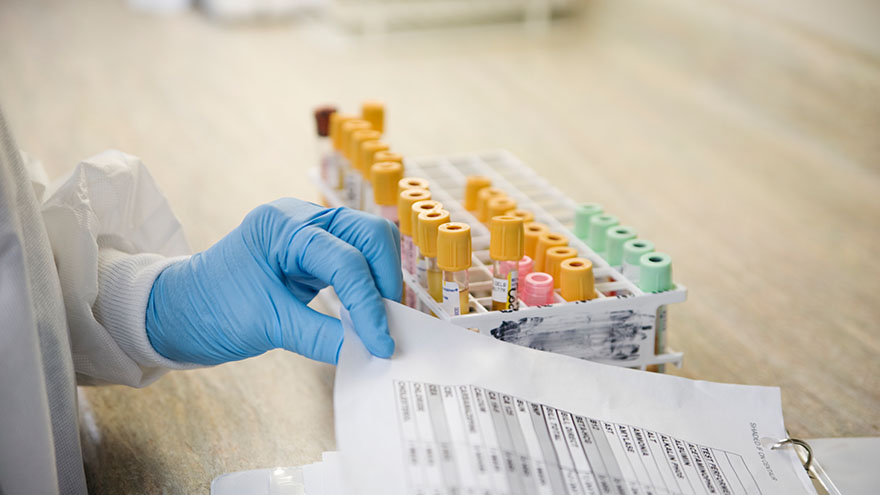Buscar
-
Departamento destacado: Patología
Celebrate Leap Day by leaping into the world of Pathology at Renown Health! Think of discovering a diagnosis like solving a mystery: the condition is the suspect, the nurses are the frontline police force and the doctors are the lieutenants or captains finalizing the results of the case. You may notice that one crucial role is missing on this list – the detectives. In the diverse network of healthcare, the detectives are a significant part of each patient’s mystery-solving care team and represent many roles across our health system. When it comes to figuring out the elaborate details of a growth, disease, organ abnormality or cause of death, one team of detectives, quite literally, goes as deep as possible. Those detectives are the team members within Renown Pathology. For each specialized field within medicine or surgery, the Pathology department is here to play a crucial role in accurate diagnoses. With each slide examined and each test meticulously conducted in their bright laboratories, these dedicated professionals shape a path towards wellness and recovery. Meet Your Anatomy Experts Whether you have a chronic disease that needs consistent testing, a high-risk birth that requires placenta testing, a suspected cancerous tumor that needs a biopsy or a gall stone that must be removed (or anything in between), Renown’s Pathology team steps in to provide biological answers to your body’s questions. This department offers the most comprehensive in-house diagnostic testing in the region, from routine histology to full pathology. As the busiest pathology department in northern Nevada, this team boasts the fastest turnaround times from respected experts, including: Pathologists Pathology Assistants Histotechnicians Histotechnologists Clinical Lab Assistants Let’s break down the complex nature of these team members' jobs by walking through their everyday responsibilities at work! Pathologists Pathologists are medical doctors who specialize in the study and diagnosis of disease. With every slide they scrutinize and every sample they analyze, pathologists unravel the mysteries of disease with precision and compassion. Their responsibilities include interpreting laboratory tests, analyzing tissue and fluid samples (obtained from a variety of different sources, including biopsies and surgeries), staging cancer diagnoses and providing diagnostic insights that guide treatment decisions. “Our job is to help the patients and their doctors figure out what’s wrong,” said Dr. Christie Elliott, Pathologist and Medical Director of the Clinical Laboratory at Renown Regional Medical Center. “As the bulk of our cases deal with cancer, almost every day we start with a tumor board alongside fellow surgeons, oncologists, radiologists and geneticists. From there, we order extra studies, run through our cases to make diagnoses, review slides and ensure all information goes into the charts, which is especially important as 70% of data in medical charts is from the lab. A patient’s history is everything.” Pathology Assistants With the steadiest of hands, pathology assistants, also known as PAs (not to be confused with physician assistants), guide the diagnostic journey from patient specimen to diagnosis. They can typically be found processing surgical and biopsy specimens (includes accessioning, gross examination, description, and sampling for microscopic analysis), preparing tissue samples for microscopic evaluation, helping the pathologist determine a cause of death for autopsies by conducting organ dissections and maintaining detailed records of all diagnostic findings. “As a PA, I still impact patient care without being directly patient-facing,” said Andrew Whitner, Pathology Assistant. “I handle 300-350 small tissue blocks a day. During dissections, I identify landmarks, document what I see and turn those landmarks into slides, looking for things that don’t look normal.” “Our job is 90% all about gross specimens, and we also do eviscerations for autopsies,” added Leslieann Haffner, Pathology Assistant. “We are trained on what normal looks like; our goal is to find the abnormal.” Histotechnicians Histotechnicians work behind the scenes to help transform ordinary tissue into extraordinary windows of insight, revealing the inner workings of the human body. As vital members of the Pathology team, histotechnicians embed tissue specimens in paraffin wax blocks (a process that preserves the tissue's structure for examination), cut thin sections of tissue from the paraffin blocks using a microtome, mount tissue onto glass slides and stain the tissue slides using histological stains to highlight structures or cells. “With all the patient specimens we work with, we get to see a lot of organs and learn what is causing the abnormalities,” said Reiny Hitchcock, Histotechnician. “I enjoy the opportunities to expand my knowledge, especially while working alongside the doctors.” “Our job can change by the week,” added Jessica Fahrion, Histotechnician. “One week I’ll be in the grossing room, and the next week I might be training in cytology." Histotechnologists In a world where every slide holds the key to a patient's future, histotechnologists are the champions of progress. One career ladder step above histotechnicians, these team members often have a broader scope of responsibilities, including more complex laboratory procedures, developing and validating new techniques, managing laboratory operations, interpreting results and troubleshooting technical issues. You can count on histotechnologists for validating antibodies and handling orders from pathologists, oncologists, emergency physicians and more. “My day always involves looking into cases, reading reports, getting orders together and working with pathologists to help them with their diagnoses; I also work a lot with immunohistochemistry, helping out with routine slides,” said Charles Koeritz, Histotechnologist. “I especially enjoy doing validations, which help maintain the integrity of lab testing and our diagnostic processes.” Clinical Lab Assistants Our pathology clinical lab assistants are the masters at “filling in the blanks,” assisting in whatever area needs it most, especially in cytology and the grossing room. They are essential aspects of the Pathology team, collecting and storing specimens for further testing, assisting in managing test results, gathering data, managing supply inventory and more. “As a Clinical Lab Assistant, I can be scheduled anywhere, from tissue cassetting to grossing,” said Ellie Somers, Clinical Lab Assistant. “Working in cytology is one of my favorite parts of my job. It’s very rewarding to work with the doctors to uncover what treatments will help each patient. We do cytology very well here.” The Bottom Line Even though the Pathology department doesn’t always experience a lot of patient face-to-face time, they interact with patients in a different way – by uncovering the story that is the inner workings of the human body, one slide and one sample at a time. “It’s important to remember that the slide IS a patient,” said Dr. Elliott. “We are constantly learning from every case so we can continue to provide the best patient care possible.” Take a Photo Tour of the Pathology Lab!
-
A Journey of Transformation Through Robotic Surgery at Renown Health
Carrie Hintz is constantly on the move. “I don’t sit well,” she said when discussing her career as an Emergency Room nurse at Renown South Meadows Medical Center. She has also earned a PhD in nursing research, a Nurse Executive DNP and an MSN in nursing and healthcare leadership, all while managing the joyful chaos of raising two toddlers under the age of four. She's always been on the move, but her journey to transformation through bariatric surgery with the da Vinci Surgical System is a testament to her determination and the vital need for cutting-edge robotic surgical tools at Renown Health. Carrie's life is non-stop, but her struggle with weight loss was a persistent challenge, compounded by the complexities of medical conditions like PCOS and a pituitary tumor, both of which made losing weight an uphill battle. It was while reading the news one night, witnessing a mother's disappointment at Disney Land due to weight restrictions, that Carrie decided to take charge of her life. She knew she had to make a change. In 2016, Carrie embarked on her bariatric surgery journey, seeking consultation with a Renown surgeon. However, her dreams of starting a family prompted her and her supportive husband to postpone surgery since one cannot have a baby within 18 months of the procedure. After welcoming two beautiful children into their lives, Carrie returned to Renown in 2022 to discuss her surgical options. Finally, in February 2023, and after six months of mandatory weight loss preparation, Carrie was ready to undergo the life-changing surgery. Dr. Alexander Ayzengart, her dedicated surgeon, had a plan that involved utilizing the da Vinci Surgical System for her bariatric procedure, coupled with repairing a hernia that had developed during her weight loss journey. The stage was finally set for Carrie's transformation. To everyone's surprise, the hernia turned out to be larger than anticipated, but miraculously, Carrie experienced no post-operative pain and minimal scarring. She reminisces about her early post-surgery days, confidently attributing her excellent outcomes to the remarkable da Vinci Surgical System. “I was up and walking around the night after the surgery,” she said. The da Vinci is no ordinary surgical tool; it's a state-of-the-art, minimally invasive robotic system skillfully operated by trained surgeons. Renown's commitment to innovation in healthcare paved the way for Carrie's remarkable journey.
Read More About A Journey of Transformation Through Robotic Surgery at Renown Health
-
Un análisis de sangre: las valiosas pistas que puede darle a su médico
Blood. It can make you squeamish to think about it, yet every drop is vital to your health. In fact, a tiny vial of it can tell your doctor a wealth of information. We asked Benjamin Hansen, M.D., to explain what providers can learn from a blood test and why it’s important to get one as part of your annual checkup. CBC, the initials, sound innocent enough, right? In fact, when your favorite TV doctor orders a CBC, or complete blood count, it’s often the first step in getting an overall picture of your health. "It primarily measures white blood cells, red blood cells and platelets," explains Hansen. Although a blood test is one test you don’t have to study for, the measurements it takes can point to a host of information. What a Blood Test Says About Your Health White Blood Cell Count "The white blood cell count in your CBC helps us to determine the strength of your immune system," says Hansen. "It also helps us to determine the likelihood of infection because white blood cells fight off infection. Knowing the white blood cell count can also be helpful in patients with compromised immune systems, such as those on certain medicines or with conditions that impair immunity," he adds. White blood cells are made in your bone marrow and are alive only one to three days. Therefore, your body is constantly making them. Red Blood Cell Count "The red blood cells carry oxygen from your lungs throughout your body, while also carrying away waste. The hemoglobin (red blood cell protein) count is important because it helps us determine how well you're able to deliver oxygen from your lungs to the rest of your body," states Hansen. If these counts are low, you may have trouble breathing or experience fatigue. Red blood cells also grow in bone marrow, but they have a long lifespan – generally 100 to 120 days. Why Get a Blood Test? Although the CBC is just one type of blood test, according to the National Institutes of Health (NIH) there are a number of blood tests available that can help check for diseases and conditions such as: Heart disease Cancer Anemia (low iron) Diabetes High cholesterol Alcohol or Drug use disorder HIV/AIDS Additionally some tests show how well your kidneys, liver, heart and other organs are working. If you are taking a medication, a blood test can also let your provider know if it is helping you. What to Expect From a CBC Blood Test When you are not feeling well, it may take some detective work to figure out what is wrong and sometimes a CBC can be helpful. With this in mind, a lab order from your provider is needed to order a CBC blood test. Some blood tests require you to not eat food (fast) eight to 12 hours before the blood draw. Your provider will let you know the type of blood test(s) they are ordering for you. Usually it's important to drink plenty of water before your blood test, to make it easier to locate your veins. Generally a small sample of blood is taken from your arm vein and then sent to a lab for analysis. Discussing Your Results "A CBC can help your provider determine if there is an infection, your level of immunity, if you are anemic or if you are prone to bleeding," says Hansen. When to Get a Blood Test "A CBC is usually ordered for a specified purpose. If you think you might need a CBC, please call your provider. It's also important to see your provider regularly to keep an eye on your health. Many patients should see their provider at lease yearly," Hansen clarifies.
Read More About A Blood Test: What Valuable Clues It Tells Your Doctor
-
Do You Resolve to Lose Weight and Live Healthier? Here's How.
Weight loss and healthier living tend to top most people’s lists of New Year’s Resolutions. So if you’re like the vast majority, here’s help — a comprehensive look at all of Renown Health’s programs that will help you lose weight and tackle metabolic challenges. Quick quiz: How many of the following apply to you? You have a need to lose weight, but you haven’t been guided on how to make sustainable change; You’re experienced a recent rapid weight gain, but lab tests didn’t reflect a change in your health; You’ve experienced a life-changing event that caused weight gain; You have problems with where you are carrying your weight, such as your mid-section; You’ve tried other weight loss programs, but they didn’t work. If you found yourself nodding in agreement to any one of the above statements, Renown’s programs can help. They cover the spectrum of helping with weight or metabolism challenges. But the million dollar question is: Where do you start? How to Lose Weight and Live Healthier Ideally, it’s best to start by talking with your primary care provider. Your provider knows your medical history and concerns related to your health. Talk to your provider about your past history with weight loss and gain. Your primary care provider will assist with the referral process and provide you with options you might not considered on your own. Most importantly, by starting with your primary care provider, you can take full advantage of all your health benefits. Renown offers four weight loss/management programs: Medical Nutrition Therapy Meet one-on-one with a Registered Dietitian at Renown’s Health Improvement Program to discuss your health goals. You may qualify for this program if you have: Heart or kidney disease Gastrointestinal issues Weight gain or weight loss Food allergies or sensitivities High blood pressure or high cholesterol A thyroid condition Diabetes – classes available, including: Type 2 Diabetes, insulin and gestational diabetes management during pregnancy (Offered in English & also in Spanish). For more information, call 775-982-5073. Medical Weight Management This program includes a one-on-one appointment with a board-certified bariatric doctor. You will receive a comprehensive evaluation and customized treatment plan to meet your needs and medically manage your overweight or metabolic challenges. Treatment options in this program may include nutrition changes, meal replacements, medication, exercises and also behavioral therapy. Here are a few qualifications for the program: A BMI of 25 or higher and health risk such as Type 2 diabetes, obstructive sleep apnea, cardiovascular disease, stroke, gout, osteoarthritis, infertility or polycystic ovarian syndrome A BMI of 30 and higher A metabolic problem such as diabetes, fatty liver and is not responding to regular medical care. Those with a metabolic problem may be considered normal weight, however may need to lose fat mass or reduce their waist size to get healthier. An increased risk of heart disease, stroke or Type 2 diabetes, regardless of weight that is not responding to regular medical care. For more information, call 775-982-5073. Bariatric Weight Loss Surgery We understand that the desire to have bariatric surgery is a choice you are making for your long-term health. Our team provides education on the necessary steps before, during and after surgery to ensure you are successful in controlling your obesity. You may qualify for this program if you have: A BMI of 40 or more, or: A BMI of 35 to 39.9 with significant health problems such as hypertension, high cholesterol, sleep apnea, diabetes or diagnosed arthritis To learn more, visit our Bariatric Surgery. You may also attend one of our monthly Weight Loss Surgery Seminars to learn if you are a candidate. Dietary Consultation at Renown Medical Group Many people aren’t aware that you can schedule short, frequent visits with a registered dietitian at Renown Medical Group locations in Reno or Sparks. Telehealth is also available at the Renown Medical Group – Fernley. Qualifications include: A BMI of 30 or greater You have a primary care provider with Renown Medical Group Medicare or Senior Care Plus member Since this program is only offered through Renown Medical Group, you must be an established patient. To establish with a primary care provider, call 775-982-5000. Talk to your primary care provider to see if you qualify for one of Renown’s weight management programs. Going through the referral process is the best way to ensure you are taking full advantage of your health benefits.
Read More About Do You Resolve to Lose Weight and Live Healthier? Here's How.



